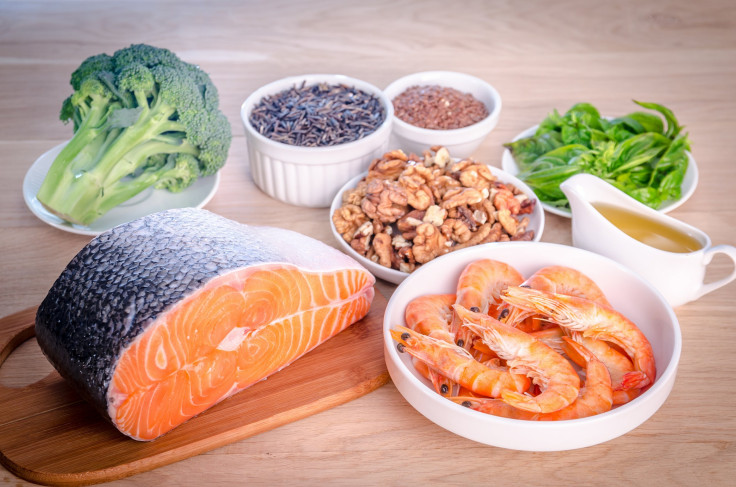Omega-3s Could Curb ADD In Kids, And Most Americans Still Don't Consume Enough

Food can be medicine if it’s used right and fed early into young, growing bodies. Despite the overwhelming conclusive findings that omega-3 fatty acids can benefit the body in a way no other supplements can, Americans can’t meet basic recommendations. A new study from the Journal of the American Heart Association found after 30 years, Americans still aren’t eating enough healthy, brain-empowering omega-3s, which may have the power to curb ADD in children.
“First, we tried to figure out why in the last two years there’s been a sharp decrease in the amount of omega-3s people are consuming in their diets,” Executive Director of the nonprofit Global Organization for EPA and DHA Omega-3s (GOED) Adam Ismail. GOED has launched “Always A Good Idea” campaign to encourage and educate the public to regularly include omega-3s into their diets. “We figured out it just comes down to reminding the public and educating them. There is a massive public deficiency and as a result they’re missing out on a lot of important brain and heart health benefits.”
Omega-3s are not naturally produced by the body, which is why humans need to supplement either from diet or pill form to reach the 250 milligrams (mg) dosage recommended by the World Health Organization (WHO). Docosahexaenoic acid (DHA and eicosapentaenoic acid (EPA), are the two crucial types of fats we’re depriving our bodies of every day. There are also alphalinolenic acid (ALA), which are plant-based and found in nuts and seeds, but don’t provide brain benefits and rather improve the cardiovascular system and reduce inflammation. The brain is 60 percent fat and requires more DHA than any other tissue in our body, which is why it has the power to improve brain function so effectively.
“There are only two types of omega-3s we know to have a positive effect on mood, brain function, and power, and that’s EPA and DHA. Registered dietitian and author Elizabeth Somer told Medical Daily. “We know the brain benefits extremely because it’s backed by solid and reliable research. Researchers have found it’s so important and beneficial to patients with depression, the American Psychiatric Association actually recommends that these omega-3s be included with any treatment for depression, even in extreme cases.”
A contributing factor to why Americans don’t prioritize meeting omega-3 recommendations is because the government hasn’t caught up with the research yet. “We’re basically the last developed country who doesn’t officially recommend a daily omega-3 intake,” Ismail said. “The government doesn’t have the right processes in place. Doctors don’t always understand all of the benefits omega-3 can provide. It could take 3 to 5 years for the FDA (U.S. Food and Drug Administration) to make it a recommendation on the nutrition labels.”
Since omega-3 fatty acid intake continues to remain at a steady low among Americans, we’re missing out on an incredible amount of health benefits. Each one of the brain’s 100 billion cells is encased in a fatty membrane, which sends important messages to other brain cells while also eliminating toxins, and absorbing oxygen and nutrients. Without omega-3 DHA, the brain seeks out a cheap replacement that gets the job done, but not as well as it could if it received the fats it’s designed to use. Fortified food has 32 mg per serving, while supplements can supply around 300 mg per pill. If you’d like to turn to a food source for a healthy dosage, white fish packs 235 mg per serving and fatty fish has 541 mg per serving.
“Our bodies can’t make it on its own so we have to get it from diet,” Somer said. “Fatty fishes, such as salmon receive their omega-3s from algae that concentrates in their tissues. They’re not high on a child’s priority list as far as eating is concerned, but DHA can still be slipped into their diets other ways. Horizon milk and Rinaldi pasta sauce have good levels, but a 200mg supplement is a safe recommendation for children.”
So far only the benefits of omega-3 DHA for children with attention deficit disorder have been highlighted in preliminary findings, but they make sense, according to Somer. We’ll have to wait until further studies are released before it becomes an official recommendation similar to patients with depression. A study out of Purdue University found kids with low omega-3 essential fatty acid levels are more likely to be hyperactive, have learning disabilities, or exhibit behavioral problems.
There have been literally thousands of studies analyzing and confirming over and over again how beneficial omega-3s are to the body. One of the most important findings was published in the DHA (docasahexaenoic acid) Oxford Learning and Behavior (DOLAB) study. In a double-blind randomized study, children were given either an omega-3 DHA or a placebo, and within 16 weeks parents reported a significant improvement in their child’s reading ability and behavior. There is an urgent need for effective learning interventions for children, and if these findings can be replicated, omega-3 DHA may transform into a safe and natural treatment.
“Our bodies were built on an evolutionary assembly line where we hunted, gathered, or fishes for our foods,” Somer said. “But today we eat a diet of sawdust. We need to help our bodies grow and maintain, especially little bodies. By feeding our bodies the right building blocks, we’ll be able to function correctly. It’s the whole diet that’s important, though. You can’t just feed your kids McDonald’s and soda pop and then give them a DHA supplement and think they’ll be fine.”
Source: Steffen LM, Honours MA, Harnack LJ, and Zhou X. Trends in Fatty Acid Intake of Adults in the Minneapolis-St Paul, MN Metropolitan Area, 1980-1982 Through 2007-2009. Journal of the American Heart Association. 2014.



























